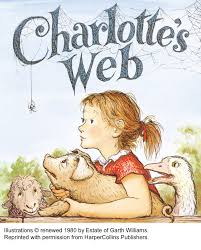A few Sundays ago, when I was visiting my family, my little sister pulled out a paperback copy of “Charlotte’s Web” and asked if I would read to her.
 I hadn’t read the book in years – maybe not even since I was 8, the same age as my little sister. We sat down on the sofa, and I turned the pages to Chapter 1:
I hadn’t read the book in years – maybe not even since I was 8, the same age as my little sister. We sat down on the sofa, and I turned the pages to Chapter 1:
“Where’s Papa going with that ax?” said Fern to her mother as they were setting the table for breakfast.
“Out to the hoghouse,” replied Mrs. Arable. “Some pigs were born last night.”
“I don’t see why he needs an ax,” continued Fern, who was only eight.
“Well,” said her mother, “one of the pigs is a runt. It’s very small and weak, and it will never amount to anything. So your father has decided to do away with it.”
… Fern pushed a chair out of the way and ran outdoors. …
“Fern,” said Mr. Arable, “I know more about raising a litter of pigs than you do. A weakling makes trouble. Now run along!”
“But it’s unfair,” cried Fern. “The pig couldn’t help being born small, could it? If I had been very small at birth, would you have killed me?”
Mr. Arable smiled. “Certainly not,” he said, looking down at his daughter with love. “But this is different. A little girl is one thing, a little runty pig is another.”
“I see no difference,” replied Fern … “This is the most terrible case of injustice I ever heard of.”
A queer look came over John Arable’s face. He seemed almost ready to cry himself.
“All right,” he said.
Fern’s words almost seem prophetic, “If I had been very small at birth, would you have killed me?” Today babies in the womb are killed just because they may have a disability or abnormality. Many parents are pressured toward abortion because their baby is imperfect in the world’s eyes. Our society justifies these babies’ deaths with excuses: The baby may suffer, or the baby could be a burden for the family, or the baby may not live long anyway. I think the problem lies with our flawed perspective, not these children’s lives.
I was really struck by Fern’s example. She fought and pleaded for a life who many didn’t see as valuable. She gave up her time to provide the extra care and attention that that life needed.
Fern approached the situation from the simple, untainted logic of a child. She didn’t think twice. She didn’t question whether a life was worth saving, because it never occurred to her to question the value of a life at all. She understood that every life deserves protection, no matter how long they live or how much care they need.
I’m so glad “Charlotte’s Web” is still a classic on children’s bookshelves. We need more heroines like Fern.
